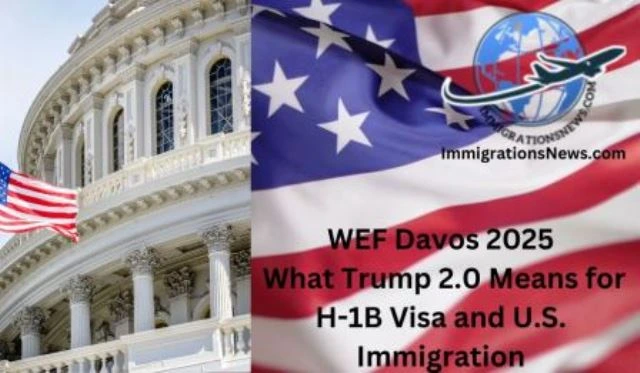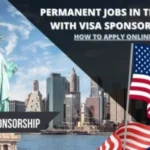Discover insights from Ian Bremmer at WEF Davos 2025 about the future of H-1B visa and U.S. immigration under a second Trump presidency. Learn what the experts say about legal immigration and the “America First” agenda.
The Future of H-1B Visa and U.S. Immigration Under Trump 2.0
The H-1B visa and U.S. immigration are pivotal topics as global leaders gather at WEF Davos 2025. Top geopolitical expert Ian Bremmer recently shared his perspectives on what a second Trump presidency could mean for these areas. While Donald Trump’s hardline stance on illegal immigration remains a key issue in his 2024 campaign, Bremmer believes that the H-1B visa program will likely remain unaffected by major changes. In this article, we’ll explore the future of U.S. immigration policies under Trump 2.0, focusing on H-1B visas, the implications for skilled workers, and how these developments may affect international talent.
Understanding the H-1B Visa Program: A Gateway for Skilled Workers
The H-1B visa program has long been a crucial pathway for skilled workers from around the world, particularly from countries like India. This visa allows foreign nationals in specialized fields—such as technology, healthcare, and engineering—to work in the United States for a set period. However, the future of this visa program is often a topic of debate, especially with the shifting political landscape in the U.S.
The Importance of the H-1B Visa for Skilled Immigrants
| Aspect | Details |
|---|---|
| Target Applicants | Skilled professionals in fields like technology, engineering, and medicine |
| Annual Cap | 85,000 new H-1B visas issued each fiscal year |
| Eligibility | Requires a job offer from a U.S. employer in a specialty occupation |
| Duration | Typically issued for 3 years, extendable for a maximum of 6 years |
The H-1B visa program is essential for U.S. companies to tap into global talent, especially in high-demand sectors. However, under a potential Trump 2.0 presidency, the program could face changes that may impact its accessibility for workers.
Trump’s Stance on Immigration: A Focus on H-1B Visa
During his conversation at WEF Davos 2025, Ian Bremmer discussed Trump’s views on illegal immigration and the impact on skilled workers coming to the U.S. under programs like the H-1B visa. While Trump has often emphasized stricter control over illegal immigration, Bremmer suggests that the H-1B visa may be less affected compared to other aspects of U.S. immigration policy.
What Ian Bremmer Said About H-1B Visa Under Trump 2.0
Bremmer expressed confidence that H-1B visa holders, particularly those with highly sought-after skills, would not face significant challenges under a second Trump administration. “Elon Musk and Ramaswamy support the H-1B visa program and legal immigration,” said Bremmer, highlighting the role of influential figures in Trump’s inner circle.
Why the H-1B Visa May Be Safe:
- Support from key U.S. business leaders: Major figures like Elon Musk back the H-1B visa, recognizing the value of foreign talent to U.S. industries.
- Skilled workers’ importance: U.S. companies, especially in tech and finance, rely heavily on foreign professionals to fill high-demand positions.
- Political balance: While Trump’s base may be resistant to general immigration, the importance of skilled labor could maintain some level of stability for H-1B visa holders.
Broader Impact of Trump’s “America First” Agenda on Immigration
Bremmer also discussed the America First stance, which prioritizes U.S. interests in policy decisions. While H-1B visa holders may face fewer challenges, Bremmer warned that Trump’s rhetoric around immigration could influence global talent’s perception of the U.S. as a welcoming destination.
Impact on Global Talent: Will They Choose the U.S. or Other Countries?
| Factor | Impact on Immigration |
|---|---|
| “America First” Sentiment | May make the U.S. less attractive to foreign professionals who value inclusivity and diverse opportunities. |
| Anti-Immigrant Sentiment | Could deter skilled workers, particularly from countries like India, from pursuing opportunities in the U.S. |
| Competition from Other Countries | Nations like Canada and the U.K. may become more appealing due to their more welcoming immigration policies. |
Bremmer noted that many talented individuals from India, particularly in tech and healthcare, may look elsewhere for job opportunities if they feel unwelcome in the U.S. Canada, with its more open immigration policies, could become a more attractive destination for these skilled professionals.
The Future of H-1B Visa and U.S. Immigration
While H-1B visa holders may not face drastic changes under Trump 2.0, other factors related to the U.S. immigration environment could shift, depending on broader policy changes. The future of U.S. immigration will depend on how the Trump administration balances national security concerns, economic needs, and the demand for skilled labor.
Potential Outcomes for H-1B Visa Holders:
- Increased Scrutiny: While the H-1B visa program may not be eliminated, there could be heightened scrutiny or stricter requirements for applicants.
- More Competition: As countries like Canada and Australia become more appealing to foreign workers, the U.S. may see increased competition for global talent.
- Continued Support for Skilled Workers: Trump’s policies may continue to support skilled workers in high-demand sectors, as long as their presence benefits U.S. companies.
Navigating the Future of H-1B Visa and U.S. Immigration
As the WEF Davos 2025 discussions unfold, it is clear that the H-1B visa and U.S. immigration policies will remain a topic of significant debate. While Trump’s hardline stance on illegal immigration is expected to gain momentum, skilled workers seeking H-1B visas may find some stability due to support from influential U.S. business figures.
However, the broader impact of the America First agenda may cause concerns for those looking to move to the U.S. for work. As the U.S. faces increased competition from countries with more welcoming immigration policies, the future of immigration will depend on the balancing act between national security, economic needs, and global talent retention.



